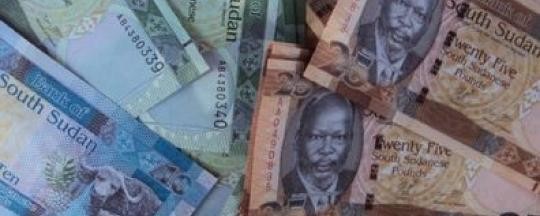The author of this article is a South Sudanese student pursuing Law Degree at the University Of Ain Shams in Cairo, Egypt. He questions the motives behind the devaluing of the South Sudanese pound, and states that oil wealth is wasted on war efforts, which will result in “ruined economic hardship if the current economic setbacks still being imposed by the government continue.”
Until the declaration of the austerity measures in 2012 by the government of the Republic of South Sudan, South Sudan was named as the third largest sub-Saharan country in terms of oil reserves. It is also on record that the Republic of South Sudan ranks number five on the Africa oil index. So at this critical point, South Sudan is a country rich in oil, which will make it self-reliant in terms of hard currency. It also exports timber, although it contributes little to the national economy compared to the oil which provides the South Sudan economy with 97.5 % of the total national budget.
In respect to the international development and financial assistance to Africa, international aid flow to South Sudan increased starting from 2008 until the crisis in 2013. It is filed that in 2010 beginning from 2008, the financial assistance to South Sudan jumped rapidly from US $696.5 million to US $1.3 billion within these two consecutive years. So, until 2011 since 2008, the official financial development reached 3.8 billion United States dollars.
Then when South Sudan is rich in all these ways, the question will be, why does the government through the minister of finance and economic planning Aggrey Tisa Sabuni and the governor of central bank of South Sudan Kornelio Koryom want to devalue the South Sudanese Pound (SSP) against United States Dollar (USD) from 2.96 SSP to 4.50 SSP? Do they consider it as a political ambition? How will the legacy of these two men look like after all these attempts? Or is it an economic threat from the current conflict to the nation that it must have its currency devalued?
By now it is too mysterious whether the devaluation of the currency is attributed to the current conflict inflicted on the nation by the government now active in the country since it is not the first time for these two men to rush to the proposal of devaluation of the currency. On 19th of September 2013, Mr Kornelio Koryom who was and is the current governor of the central bank of South Sudan, wrote a letter to the president and parliament as well acknowledging them for the devaluation of the SSP which he has already declared and put in force already. Inside that letter, the governor stated that with effect from now, the official price for the USD is 4.50 SSP/1 Dollar. But he did face criticism from the parliamentarians and within a short period of time he lifted the devaluation.
Repeating what he had done with assistance from the minister, Kornelio now has wrote a letter to president Kiir requesting him to approve the devaluation of the national currency after heated controversial debate in parliament in which he was backpedalled by the lawmakers in the country.
In fact, South Sudan’s Salva Kiir-led government has vandalised the national economy, the current conflict which did emerge out of Juba massacre has wrecked South Sudan’s richest economy. But it is not a natural calamity nor it was an external aggression and in fact that has resulted in this disastrous economic hardship and has imposed radical setbacks to the nation’s already ruined economic progress. The country’s security sector has dilapidated almost the country’s 2014/2015 fiscal budget, the bargaining of foreign forces like the UPDF and the Sudanese Revolutionary Front as well as bribing international legal experts and organisations to help the government sell its controversial coup narrative cost the government almost US $4.92 million daily only on the national security sector. This entitles the UPDF to US $1.12 million, SRF US $0.70 million, and the SPLA-Juba US $3.1 million on daily basis. So at this point the government’s prodigality of the national resource lacks the sustainable development policy. South Sudan’s children, the next generation, are left in a ruined economic hardship if the current economic setbacks still being imposed by the government continue. According to 2008 census, the population of South Sudan was put at 8 million people which means the resources that today exist in the country and the oil in particular is twice more than the population of South Sudan, and if ambitious leaders emerge in power this mayhem Republic of South Sudan would be twice than the post-Gadaffi Libya.
The intransigency of president Salva Kiir for pursuing self-interest if not halted will drag the nation into serious economic plugout.
The views expressed in ‘opinion’ articles published by Radio Tamazuj are solely those of the writer(s). The veracity of any claims made are the responsibility of the author(s), not Radio Tamazuj.




